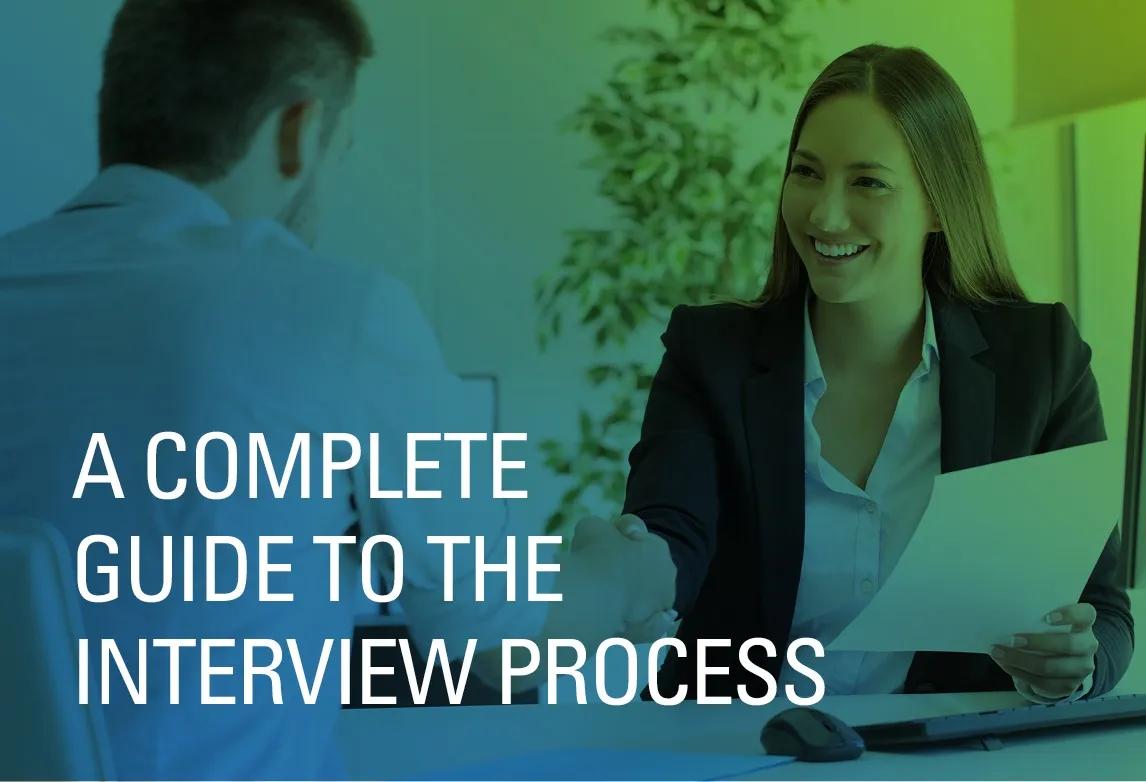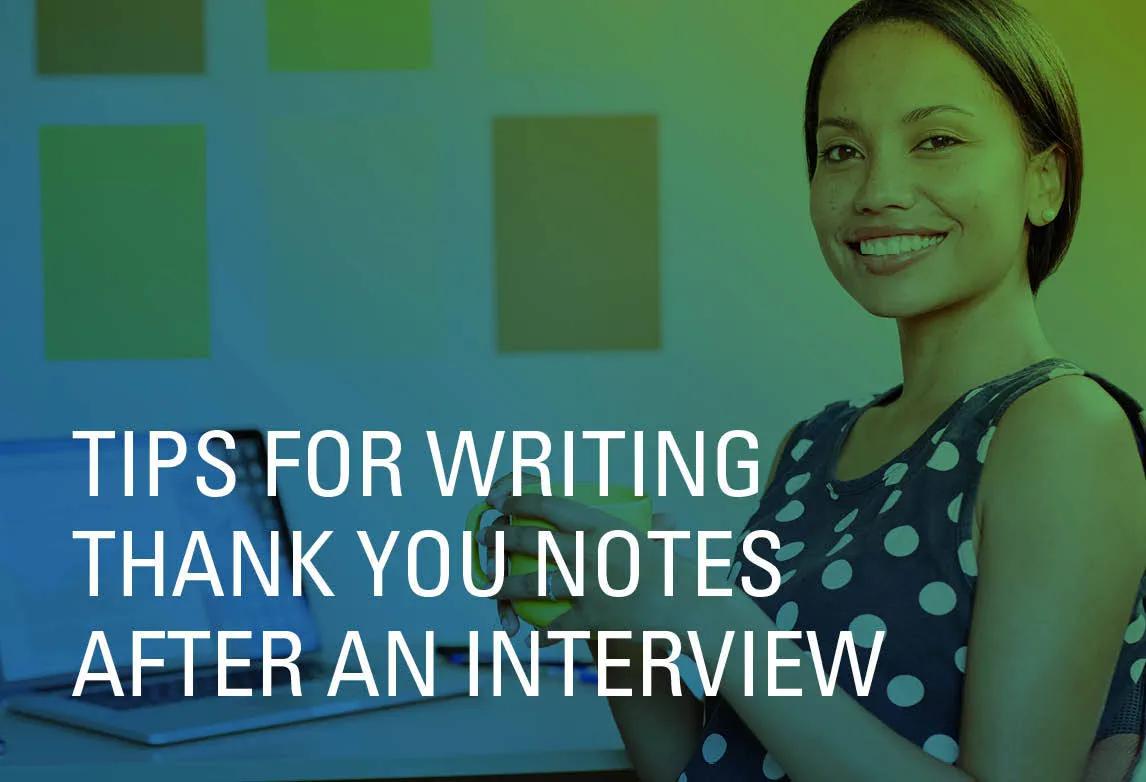A Complete Guide to the Interview Process

Navigating the Job Interview from Preparation to the Thank You Note
One step between obtaining your education and enjoying a career in your field of choice is the job interview. An interview is your opportunity to shine a light on your achievements, experience, and skills, while also demonstrating to the hiring manager why you are the right person for the job. Getting yourself ready for each step in the process can help you put your best foot forward. This involves preparing in advance, making a good impression at the interview itself, and following up once your meeting is over.
Stage 1: Interview Preparation
The average prep time for a job interview is between five and 10 hours.1 This preparation includes researching the potential employer, familiarizing yourself with interview questions you may be asked, and rehearsing what you’ll say. While UMA’s Career Services team can help with this, there are also a few things you can do to get started on your own.
Research Key Information About the Organization
Researching the company holding the interview serves a few purposes. One is that it helps you determine whether that employer is a good fit for you. This is important because if it isn’t a good fit, you’re more likely to feel stressed, dissatisfied with your work, and disengaged.2 It involves looking at the company’s culture to see if you’d be comfortable working there and considering whether its core values align with yours.
Two, learning what you can about the company shows that you’ve come to the interview prepared and have done your research. And three, it helps you prepare a list of things you may still want to know before considering if this is an employer you want to work for and with.
When doing your research, look at the organization’s website and its social media pages. Also, read any online reviews about the company, look for news articles about it, and consider job search sites such as Glassdoor where current employees can share what it’s like to work there.
Things to look for during your research include:
- The company’s mission and vision
- Its core values
- The services/products it provides
- The clients it serves
- What it says about its employees
- Who is in top positions (you can also learn more about them on LinkedIn)
- How it stacks up against its competitors
- The size of the company and whether there’s room for advancement
- If it’s involved in any charitable organizations or other forms of philanthropy
This type of information will give you a good feel for what the organization is about and how it operates. Based on what you find, you’ll also have a better idea if you are a good fit for the company and if it is a good fit for you.
Familiarize Yourself with Popular Interview Questions
After doing your research, it’s helpful to consider the questions that the interviewer is likely to ask during the interview itself. This enables you to formulate your responses in advance and can decrease the stress that you might feel if you are put on the spot.
Harvard Business Review shares that some of the most common job interview questions are:3
- Tell me about yourself and describe your background. They want to know how your education, training, passion, and experience make you a good candidate for the job opening.
- How did you hear about this position? If someone recommended the job to you, let the interviewer know. Otherwise, say how you learned of the position.
- What type of work environment do you prefer? Do you prefer a structured environment or one that is more laid back, for instance? Think about the environments you excel in and why.
- How do you deal with pressure or stressful situations? Talk about some of the strategies you use, sharing a story about a time you responded well under pressure if you have one.
- Do you prefer working independently or on a team? Think about the traits you have that make you a good person for working on your own, as well as the traits that make you a valuable part of a team. Consider sharing some of each to show that you can work in both conditions.
- How do you stay organized when balancing multiple projects? The interviewer is looking for your level of efficiency and productivity. Prepare to discuss the techniques you use to keep organized, also sharing an example of a time when you balanced multiple projects if you have one.
- In the last year, what did you to do improve your knowledge? This question may come up post-pandemic, especially if you have been off work. The employer might ask this because they want to know what you did to progress yourself academically or stay current in the field when not working.
- What are your salary expectations? Know in advance how much the position that you’re applying for generally makes. You can find this information on the Bureau of Labor Statistic’s website, such as on its Healthcare Occupations page. Use this data to provide a salary range, erring on the side of asking for a bit more so you have room to negotiate.
- Are you applying for other jobs? This question may be asked if the interviewer wants to know whether the company is your top choice or just one of multiple options.
If you took a gap year in your employment, you might also be asked why you took the year off. If you had experiences during that year that better prepared you for the open role, now is the time to share them.
If the position that you are interviewing for is remote or work from home, the hiring manager may ask slightly different questions. These might include:4
- Have you ever worked from home? If so, what are some challenges you faced and how did you overcome them?
- Why do you want to work remotely?
- Where do you plan to work? (home office, shared co-working space, etc.)
- How would you rate your skills in working with technology?
- How do you prefer to communicate with other remote team members?
- What strategies do you use to stay focused when working remotely?
- How do you “switch off” after work?
Rehearse What You’ll Say
Just as a public speaker practices their speech until they know it without much thought, rehearsing some of the things you want to say during an interview can provide the same benefit. At the same time, you don’t want to be so scripted that you don’t come off as genuine. So, practice what you’ll say but also be willing to let the conversation flow in different directions.
Practicing how you’re going to introduce yourself can help get the interview off on the right foot. Practicing how you’ll thank the interviewer for their time once the interview has ended helps it end on the right foot too.
You can also rehearse what you’ll say during the interview itself. You’ve already done a bit of this by thinking about your answers to some of the most common interview questions. It’s also good to go into the meeting with a list of the things you want to know. Asking questions makes you sound interested in the position. It also shows that you’re putting a lot of thought into the job and what it entails.
If your research left any questions about the company or the position, these should be added to your list so you can rehearse how you’ll ask them. Other questions to consider asking in the interview include:5
- Can you elaborate on the job’s day-to-day responsibilities?
- What characteristics would help a person succeed in this role?
- What are some of the challenges a person in this role might encounter?
- How is performance measured?
- What type of career path does this position fit into?
- What do you like best about working here?
Stage 2: The Interview Itself
After the preparation stage is complete, it’s time for the interview. Factors to consider during this portion of the process include dressing for success, making arrangements to be there early, and following job interview etiquette.
Dressing for Success
What you wear to the interview can help make or break your first impression. Wearing something that makes you feel confident also makes it easier to walk into the interview with your head held high. Some basic interview attire guidelines include:
- Wear professional clothing. Even if the work environment seems casual, you are better off wearing clothing that you’d see in a professional office setting.6
- Keep your clothing colors neutral. Stick to black, brown, blue, and grey clothing. This helps prevent the interviewer from being distracted by what you have on.7 If you do want a bit of color, you can add it with your accessories.
- Aim for conservative. Healthcare staffing and recruiting agencies recommend staying away from sexy clothing and short skirts as hiring managers complain about this type of dress, which can be seen as unprofessional and a distraction from the interview’s purpose of assessing your skills.8
Take the time to check over what you plan to wear to make sure there are no stains on it, no missing buttons, or anything else that may make you look unkempt. Now is also a good time to iron out the wrinkles or, if you have enough time, take your outfit to the cleaner and get it pressed.
In addition to checking your garments for any noticeable issues, try them on to make sure they still fit and that you have all the pieces you need. Also pay attention to anything else that could be a potential turn-off to a hiring manager, such as an odor of cigarette smoke. Doing this in advance gives you time to make changes if something doesn’t feel right, is missing, or somehow leaves you feeling less than confident.
Be Early for the Interview
It can look bad if you show up for your job interview late. For some interviewers, even arriving on time is a sign that you don’t take the opportunity seriously.
Make arrangements to be at your interview 10 to 15 minutes early. If the interview is quite a distance away, planning to get there earlier than this ensures that you won’t be sidelined by an unexpected traffic jam or a flat tire. You can always go to a local coffee shop and gather your thoughts until it’s time for the interview or reference your notes in the car while you wait.
Follow Interview Etiquette
Following certain etiquette during the interview is another way to make a good first impression. This includes listening carefully to the questions before giving your answer, being honest with your responses, keeping a positive tone throughout the meeting, and not interrupting the interviewer.
At the end of the interview, the hiring manager will likely ask you if you have any questions. Now is the time to look at your list and see if there is anything that wasn’t already covered. You may also want to inquire about the next steps in the interview process so you have a better idea of what to expect moving forward.
Stage 3: After the Interview
While it may seem like your only duty after the interview is to wait and see if you get an offer, there’s still something you can do to potentially get a leg up. It involves sending a thank-you note.
Sending a post-interview thank-you letter can help you stand out from job candidates who don’t take this additional step. It’s also a way to reaffirm your interest in the position (and the company) while showing that you’re willing to put in more effort in an attempt to get hired.
A well-crafted thank you provides yet another opportunity to impress the interviewer with your communication skills. Plus, sending a thank you after your discussion is simply a kind gesture. It tells the interviewer that you appreciate their time and consideration.
How to Craft a Post-Interview Thank You Note
An effective thank you letter that is sent after a job interview contains a few essential elements:9
- A personalized greeting, such as by starting the letter with “Dear Mr. Smith” or “Hello Ms. Jones”
- Words of appreciation, expressing your gratitude for the interview and thanking the interviewer for their time
- A quick recap of your education and experience, reminding them why you’d be a good match for the job
- Encouragement to take further action, such as by telling them to contact you if they have additional questions
- Your contact information, making it easier for them to get back in touch with you
Many talent-hiring specialists recommend sending this type of thank you within 24 hours of being interviewed.10 You have a couple of options for its delivery. You can send the note via email or you can write it out by hand, either delivering it personally or placing it in the mail.
Whichever you decide, it can be helpful to get the hiring manager’s contact information before leaving the job interview. If you’ve been communicating via email, you may already have it. If not, asking for their email would enable you to send an electronic thank you. Otherwise, you can send the thank you via regular mail at the company’s address.
Ideally, you want to match your communication method to that of the company to show that you’re paying attention. This also shows that you’re willing to take the steps needed to mirror their preferred approach.
Feel Stressed About Your Healthcare Job Interview?
Ultimate Medical Academy (UMA) understands how stressful job interviews can be — at every stage of the game. That’s why our Career Services team is here to help our grads prepare for job interviews, providing advice on interview attire, assisting with resume creation, and more.
UMA graduates can reach out to Career Services at any time for guidance or with help in overcoming job search challenges. Call us at 888-315-8211 to learn more about what we can do for you or visit us online.
As a UMA graduate you are giving of yourself by pursuing a caring profession, so the least we can do is care for you.
1 Indeed. How Long Should You Prepare for an Interview? (With Tips). https://www.indeed.com/career-advice/interviewing/how-long-should-you-prepare-for-an-interview#:~:text=On%20average%2C%20it%20takes%20about,basic%20interview%20questions%20and%20answers.
2 Employment Technologies. Importance of Job-Fit to Employers and Employees. https://employmenttechnologies.com/importance-of-job-fit-to-employers-and-employees/#:~:text=Employees%20who%20are%20a%20good,linked%20to%20many%20organizational%20outcomes.
3 Harvard Business Review. 10 Common Job Interview Questions and How to Answer Them. https://hbr.org/2021/11/10-common-job-interview-questions-and-how-to-answer-them
4 FlexJobs. 12 Interview Questions to Ask Remote Workers. https://www.flexjobs.com/employer-blog/interview-questions-ask-first-time-remote-worker/
5 Indeed. 30+ Questions to Ask in a Job Interview (With Video Examples). https://www.indeed.com/career-advice/interviewing/questions-to-ask-in-an-interview
6 The Balance Careers. The Best Outfits for Job Interviews. https://www.thebalancecareers.com/best-interview-attire-for-every-type-of-interview-2061364
7 CareerBuilder. What to Wear for Different Job Interviews Based on the Company. https://www.careerbuilder.com/advice/what-to-wear-for-different-job-interviews-based-on-the-company
8 The Hart Group via LinkedIn. Job Interview Clothes. https://www.linkedin.com/pulse/job-interview-clothes-roxane-hettinger-ma-io-/
9 Indeed. 4 Sample Thank-You Emails for After an Interview. https://www.indeed.com/career-advice/interviewing/sample-thank-you-letter-after-interview
10 Doyle A. Best Thank-You Emails for After an Interview Examples. The Balance Careers. https://www.thebalancecareers.com/thank-you-email-after-job-interview-2063958
Request Information
Talk with us. Start your journey.
Complete this form and we'll call you to explore options at UMA and answer your questions. We'll also email you info on how to get started. We're with you at every step!
Request Information
Talk with us. Start your journey.
Complete this form and we'll call you to explore options at UMA and answer your questions. We'll also email you info on how to get started. We're with you at every step!
About the Author
 Adam Fenster
Adam FensterAdam Fenster is a senior copywriter at Ultimate Medical Academy, with journalism experience from his time as a reporter and editor for multiple online and print publications. Adam has been covering healthcare education since 2019, with an emphasis on topics such as wellness, healthcare employment, and job preparedness. He received his BA in journalism from the University of South Florida.
Related Content


